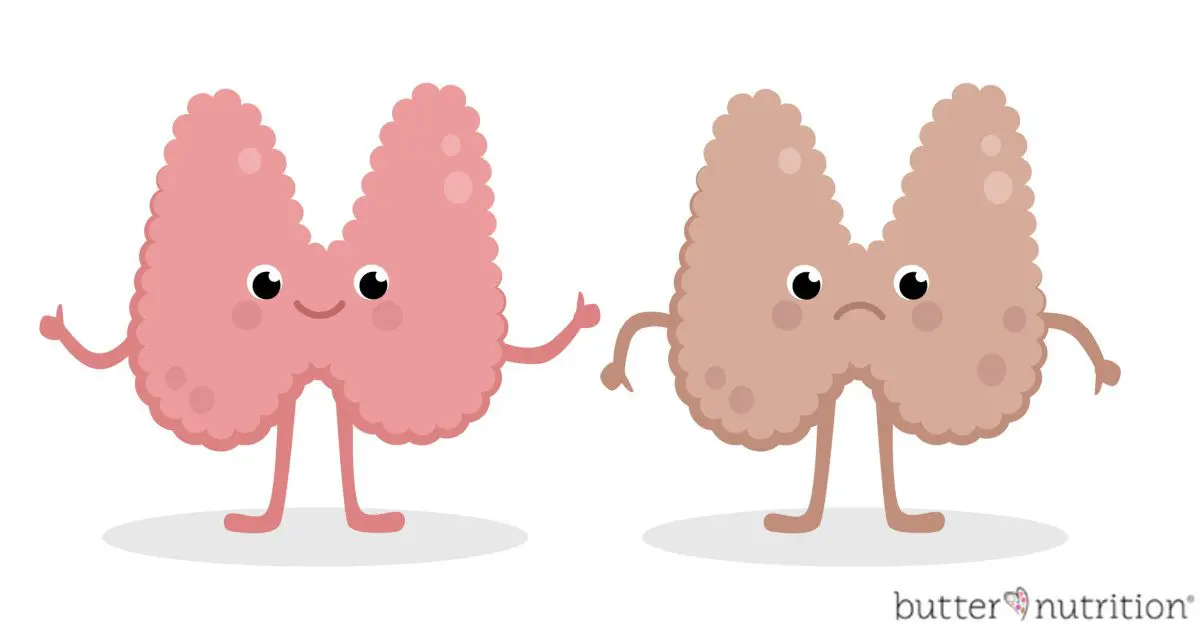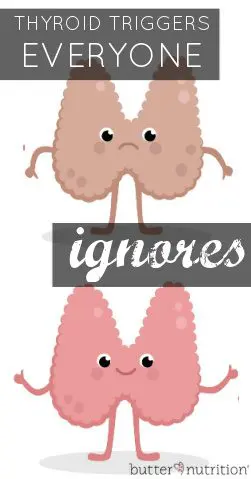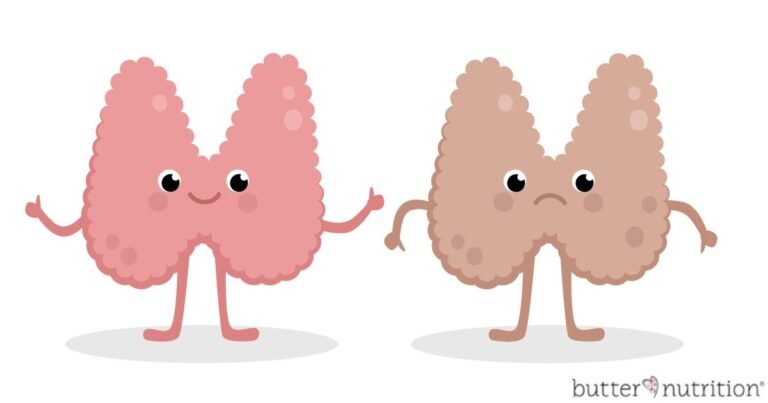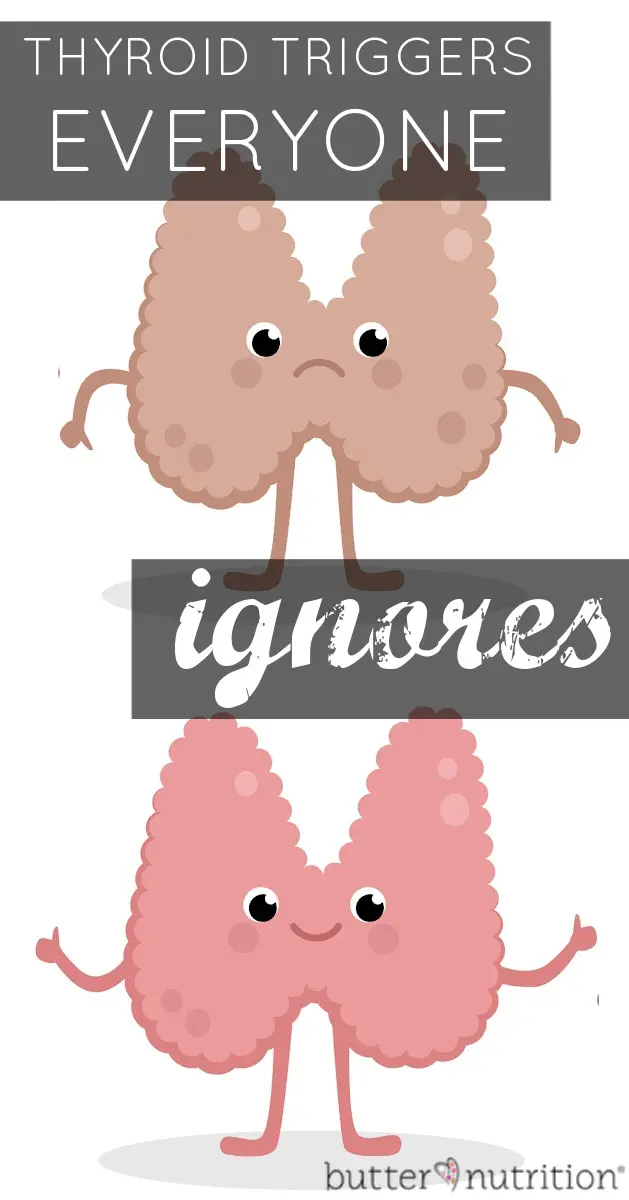
When it comes to low thyroid issues, subclinical or otherwise, it’s easy to get caught up in the weeds with what to do about it.
But going down rabbit holes with expensive tests + supplements often doesn’t yield results and can even be counterproductive.
If you zoom out, the reason for low thyroid symptoms is pretty obvious and can easily be changed with a focused approach.
Basic causes of thyroid problems
When it comes to getting to the root cause of your thyroid problems, these are the key areas you’ll want to pay attention to. I have yet to see a client with thyroid issues that doesn’t match at least one of these (usually multiple).
Liver
The liver (along with the thyroid and gut) are the primary sites where thyroid hormone conversion occurs. This is where the conversion of inactive thyroid hormone (T4) into active thyroid hormone (T3) takes place which helps give you energy and keep your metabolism running smoothly.
What do you think happens when the liver is overwhelmed with too much work to do because the body is accumulating toxins (“working”) faster than it can get rid of them? If you guessed that you reduce the conversion of thyroid hormone, you’re on target.
Improve liver health to improve thyroid hormone conversion.
Key supports: adequate protein, carbohydrates, therapeutic fiber and zinc to support healthy detoxification, along with reducing overeating and toxin exposure. Read more about how to support your liver here.
The intestine
Just like the liver, the gut is key to thyroid hormone activation. When your gut is overwhelmed with poor digestion, bacterial overgrowth, pathogens and inflammation, it will have a ripple effect on thyroid health.
Recent comprehensive medicine case reports support this, finding that symptoms originally attributed to thyroid dysfunction were instead caused by suboptimal gastrointestinal health. [1]
Key supports: short-term probiotics and dietary modifications, long-term focus on a healthy biliary-liver axis
Overeating, excessive exercise, or dieting (especially low-calorie, low-protein, low-carbohydrate diets)
Symptoms of low thyroid (or hypothyroidism) can be self-inflicted by not meeting your body’s fuel needs. Just as you wouldn’t expect your house to be warm in the winter if you couldn’t afford to pay the electricity bill, the body works in a similar way. This is an adaptive mechanism that helps you survive when your body is not getting the amount of fuel it needs.
Meet your body’s daily caloric and macronutrient needs to set the stage for thyroid hormone homeostasis.
Mainstays: adequate calories for daily expenditure, balanced diet with macronutrients
Mineral imbalances
Several years ago, in my nutritional studies, I learned about the balance of minerals needed to support optimal thyroid health, namely calcium and potassium. These two extremely important minerals need to be in good balance with each other, but it’s something I rarely see when working with my clients who are experiencing thyroid symptoms.
So, if you are dealing with these thyroid symptoms, your first line of nutritional, and in this case mineral, defense may be to get your calcium and potassium levels back into balance! If you don’t know your calcium and potassium levels, you may want to. It is very easy to find out with Hair Analysis.
OK, we need a proper balance of calcium and potassium (aka the thyroid ratio in hair analysis) to support optimal thyroid health from a mineral perspective, but the common American lifestyle amplifies this problem doubly – forcing the levels of calcium levels too high (often with too much vitamin D supplementation) and potassium levels too low.
This throws the thyroid ratio out of balance and chances are you may be familiar with the way it makes you feel.
You see, calcium slows things down in the body if you have too much of it, but high calcium levels are now commonplace because of vitamin D supplements. In short, it’s often not due to eating too much calcium-rich foods, but instead is a product of supplements vitamin D. Vitamin D supplements tell your gut to absorb more calcium from your food than it would otherwise. An even worse combination of supplements would be taking high amounts of vitamin D and calcium at the same time.
According Trace Elements Laboratory, “The inhibitory action of calcium on the thyroid has been suspected since the last century, but more recent studies have confirmed its effects. It is known that calcium reduces the activity of the thyroid and that the absorption of calcium increases in case of thyroid insufficiency. The vitamin D would also be considered to contribute to reduced thyroid function due to its close, synergistic relationship with calcium.” [2]
Key supports: balancing calcium and potassium levels (more on this here)
Fluoride
Fluoride has been shown to have a serious impact on thyroid function. In fact, fluoride was prescribed as an antithyroid drug in the 1950s to treat an overactive thyroid (hyperthyroidism) in Europe and South Africa. Consistent with the suppressive effects of fluoride on the thyroid, a 2015 study showed that fluoridated water can double the risk of hypothyroidism. The findings of the study report:
“We found that higher levels of fluoride in drinking water provide a useful contribution to predicting the prevalence of hypothyroidism. We found that practices located in the West Midlands (a fully fluoridated area) are almost twice as likely to report a high prevalence of hypothyroidism compared to the highest Manchester (non-fluoridated area)’.
Key supports: Consider reducing your exposure to fluoride. Examples include:
- Eat less processed foods. The more processed a food is, the more fluoride it contains.
- Be careful with tea consumption. Tea plants absorb fluoride from the soil resulting in high levels of fluoride in the leaves.
- Choose fluoride-free toothpaste and seek out a holistic dentist who knows the dangers of fluoride.
What about thyroid medication?
While thyroid medication can be extremely helpful in the short term (and long term for people with a thyroid removed), it can be a double-edged sword.
In an oversimplification, taking thyroid medication is like buying energy for your body with a credit card.
Seems harmless at first, right?
Wrong…
Credit cards can be an incredible tool to get things you want, but they can also be very dangerous if you don’t have the right money management to back up what you ‘spend’.
If you take thyroid medication without addressing the root cause behind it, you are essentially buying that “increased energy” with a credit card! If your body doesn’t have the nutritional reserves to pay for this energy, this thyroid medication could be plunging you deeper and deeper into a nutritional deficit that will make matters worse over time.
This is often why one needs to “up” the dose of thyroid medication over time.
The message I’m trying to get across is that if your energy is low due to a low thyroid, then there is a nutritional aspect that needs to be addressed.
No magic pill
This is what REALLY causes low thyroid symptoms and there is no magic pill or supplement that will change it. Only the habit is changed and the root cause is addressed.
When it comes to your thyroid health, remember to zoom out.
Sometimes the cause is more clear than you think!
You need help?
Need help navigating your thyroid symptoms with nutritional support? Consider the following:
PIN IT:


Bibliographical references:
- https://pubmed.ncbi.nlm.nih.gov/35999903/
- http://www.traceelements.com/Docs/The%20Nutritional%20Relationships%20of%20Thyroid.pdf
- http://jech.bmj.com/content/early/2015/02/09/jech-2014-204971

